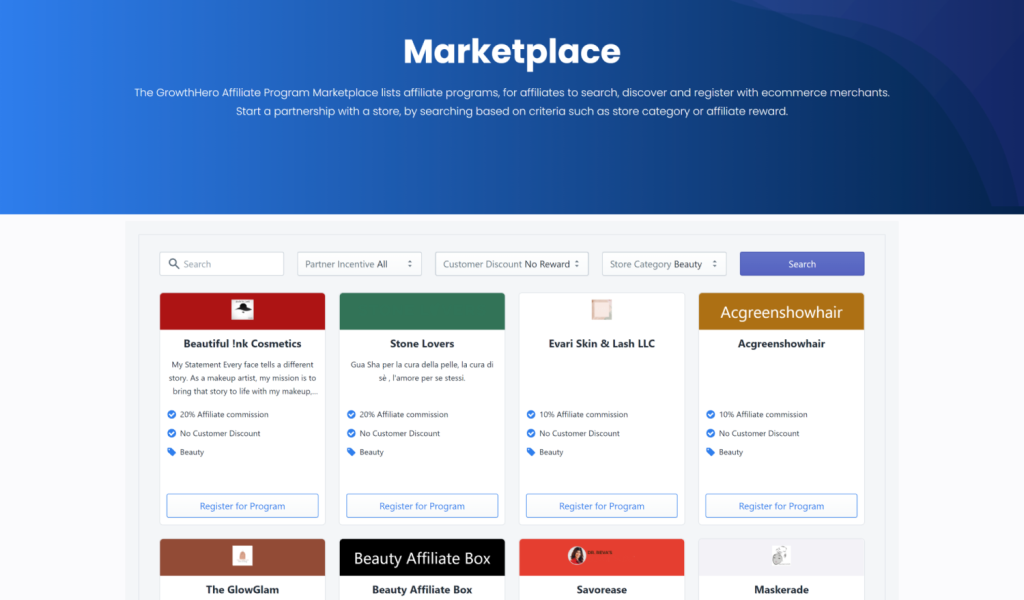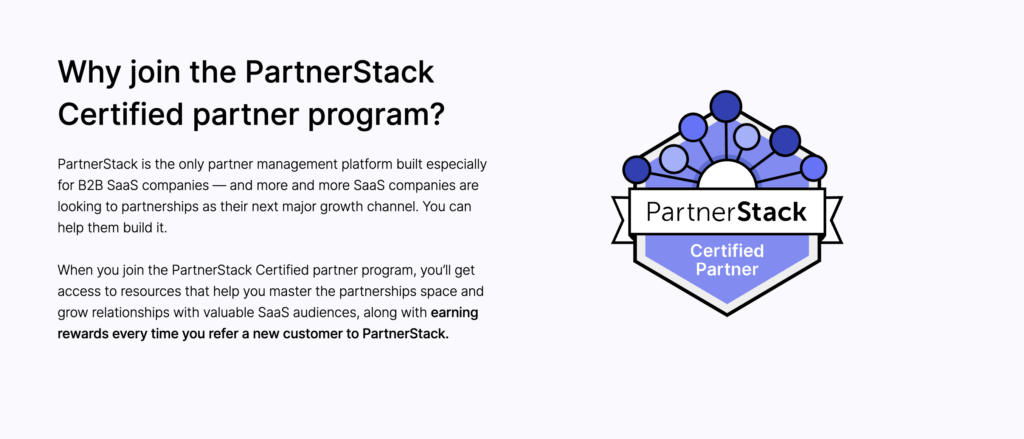
Wouldn’t it be great if you could relax on the beaches of French Polynesia while someone else is marketing your product? Whiling away the hours, margarita in hand, a good book nestled in your lap. What if we told you that this could be you? That’s right! You can have this and more for your affiliate program if you learn how to recruit affiliates.
Affiliate partnerships are mutually beneficial: both sides gain commission. With an affiliate, you can grow your audience, improve your brand’s credibility, and make money in the process.
Increase sales with an Affiliate Program
GrowthHero helps over 1000 Shopify stores succeed with affiliate marketing. Join them for free and launch your affiliate program in minutes.
Table of Contents
- What is an affiliate partnership and what are the benefits?
- The benefits of affiliate marketing
- Affiliate Recruitment Research: How to Find Your Affiliates
- Frequently Asked Questions about Affiliate Programs (FAQs)
How to Find Affiliate Marketers – What is an affiliate partnership and what are the benefits?
Affiliate partnerships are a performance-based marketing arrangement where a company rewards individuals (affiliates) with a commission. But there is a stipulation. In order to receive the commission, the affiliate must send sales to the company’s website. More sales = more money.
For online-based businesses, the affiliate uses a special link created to track traffic directed to the site. If sales are made through these links, the affiliate makes a commission.
The benefits of affiliate marketing
Affiliate marketing spending in the United States alone is expected to reach around $8.2 billion dollars by 2022, according to Statistica.
So, why are companies investing their money in affiliate campaigns?
1. Low-cost
Well, okay, sure it isn’t a free Shopify sales team, but affiliate marketing programs don’t require a large investment. You don’t need to spend money on visual ads, billboards, or purchase any other ad space. Instead, affiliate marketers come up with their own content. You can provide your affiliates with the necessary marketing tools to succeed, but it isn’t necessary.
It only requires the initial effort of recruiting and vetting affiliates. Other than that, there’s no additional effort required.
Affiliate marketing is a passive way to market your business.
There are also low continual costs. Since it’s a commission-based program, you pay for affiliates only when they bring in sales. This marketing model is easy to manage, and enhances your overall cash flow, unlike other marketing techniques.
2. Low risk, high reward
This is low risk, high reward. You front little to no money, but receive a significant return on your investment if your affiliates succeed in bringing in sales.
3. Targeted traffic
Your affiliates are vetted. Because of this, part of the traffic coming to your site is going to be individuals converting from affiliates. These individuals may find your product or service useful.
4. Scalability
You can scale your affiliate program to be whatever size you need or want at any given time. It offers you a way to scale up your business without breaking the bank.
5. High return-on-investment
Affiliate marketing has a high return on investment, compared to other marketing strategies. Some companies attribute 20 percent of their yearly revenue to affiliate sales. Why?
One simple reason: you’re increasing your base. You’re not only (hopefully) marketing in the traditional way, you’re also channeling your efforts through affiliates with direct access and influence over their targeted audience: a receptive, dedicated audience.
Hopefully, we’ve convinced you to start your own affiliate program today. If you’re not sure where to start, we have you covered.
Increase sales with an Affiliate Program
GrowthHero helps over 1000 Shopify stores succeed with affiliate marketing. Join them for free and launch your affiliate program in minutes.
Affiliate Recruitment Research: How to Find Your Affiliates

Affiliates have incredible potential to drive sales growth without requiring active management, but first you need to successfully recruit them. This might sound like traditional marketing under another name, but remember that affiliates are powerful multipliers that can richly reward your time investment. Unlike traditional marketing, where you have to reach every individual customer on your own, each successful affiliate can drive many repeat sales, all without any upfront investment on your part.
However, not all affiliates are created equal. Many individuals endeavor to convert their web following into profitable marketing deals, but only a select group of individuals can really deliver for your brand. As Italian economist Vilfredo Pareto famously theorized, in any business, 80% of outputs typically result from only 20% of inputs. Or, put another way, you may have many affiliate marketers, but cultivating and maintaining a few top performers is key to success. The trick is, those top performers are often highly in demand and are careful to protect their own brand by limiting their total endorsements (typically to less than 10). Top affiliates can be busy people, who are hard and discriminating about new business. Be sure to follow these steps so that you can maximize your chance of success during your affiliate recruitment research:
1. Get yourself an affiliate management system
The first step to finding your affiliate marketers is to have an application to track your affiliates. Microsoft Excel or Google Sheets can organize it, but wouldn’t it be better if you had an application that could do it all?
What if we told you that one already exists? GrowthHero helps over 1000 Shopify users develop their affiliate marketing programs. You can:
- Track affiliate orders using Shopify tracking links or discount codes.
- Organize your affiliates into different networks and set unique rules for each group.
- Convert customers into brand ambassadors.
- Personalize the style and content of your affiliate pages without any coding skills with a Theme Configurator.
- Analyze your partners’ traffic and sales through our dashboard and reward your affiliates for the extra effort they make to prompt your business.
I won’t bore you with additional features but using an application is the first step in the process of building out your affiliate program.
2. Perform competitive affiliate recruitment research
Just as in any marketing endeavor, knowing your market (customers and competitors) is key to crafting the right approach. What unique value proposition does your company offer? Can you clearly distinguish yourself from competitors? Who is your ideal customer? And of course, what kind of influencers are best positioned to help you reach your ideal customers? Careful discernment (and continual review) of these business fundamentals will help narrow your search and ensure that you are pursuing the most fruitful targets.
3. Use affiliate marketing directories
When you’re starting out, finding your affiliates is the first step to building your program. Without affiliates, it wouldn’t be called an affiliate program.
An affiliate program directory is a database of different affiliate programs online. An affiliate can search for the program they are looking for and sign up for the best match. Basically, it’s a traditional marketing strategy to help prime your affiliate strategy.
The promise of sitting back and waiting for the affiliates to roll in sounds tempting, but this approach requires careful due diligence to work. You need to research the traffic and domain authority of any directory you consider working with. Some charge a fee, others may require backlinks from your site. Only a high-quality directory will be likely to bring you high-quality affiliates, so be sure to invest wisely.
Rather than Google “affiliate programs,” a directory allows an affiliate to filter the search results to their program desires.
Here at GrowthHero, we have our own affiliate marketplace. If you’re looking for the best affiliate match for your program, look no further! Affiliate groups are placed and advertised in the Marketplace Listings so you can recruit your free Shopify sales team (aka affiliateS) and make them your brand ambassadors. In other words, our Marketplace lists your program for affiliates of all kinds to see. It’s a public directory but for affiliate programs.

Once you have your first few affiliates, it’s easier to sign on more.
4. Optimize your website for affiliate marketing
Don’t get too caught up in affiliate directories that you forget to tend to your own website. 25% of the affiliates find out about new affiliate programs from the merchant’s website, so you want to optimize your website. This means that you create the best user experience possible for your website visitors. Your affiliate page should have:
- The program description
- Commission structure
- Visible sign-up button

PartnerStack’s affiliate program page features information about why their program stands out.
5. Use segmentation for your ideal affiliate profiles
Affiliates can be split into different categories (coupons, discounted, review/content, etc) or by geo-targeting. Select categories matching your program and craft affiliate personas. By targeting ideal affiliate profiles, you can expand your reach.
6. Offer extra rewards for affiliates with supreme recruitment skills
Once you have your first affiliates, use these pioneers to grow your team. You can offer one-time bonuses for recruiting new affiliates, or even a full-fledged two-tier commission structure that allows first-tier affiliates to make a commission of the sales of second-tier affiliates that they recruit. Perhaps by this point, you will already be an expert and can help train your affiliates to recruit many of their own.
7. Reach out directly to influencers in your industry
Do you already have a strong pitch? Consider reaching out directly to influencers in your industry. This will be easier if the affiliate is already in your network, but you can also try cold contacting. The trick here is to ensure a compelling fit with the affiliates you reach out to. Perhaps you know of an influencer who already uses/recommends your product? Or someone whose brand and values are a close fit with your own? One strategy to find likely targets is to crawl the search engines and look for anyone who mentions your brand. Perhaps they are using a backlink to connect to you and you could offer them money for using an affiliate link?
8. Attend marketing conferences
It’s time to meet some people! Like speed dating, attending a conference will allow you the chance to quickly evaluate many potential affiliates (and vice versa). Attending presentations will deepen your knowledge of successful affiliate marketing techniques while meeting other business leaders can give you deep insights from businesses pursuing similar strategies and goals. Refining your pitch through many interactions can supercharge your recruiting. Finally, no matter how much communications technology promises to shrink the world, there is no substitute for meeting face-to-face. Why risk getting stuck in somebody’s spam folder when you have a shot at closing a deal with a top affiliate in person?
How to Get Affiliate Marketers – Frequently Asked Questions about Affiliate Programs (FAQs)
Is it easy to find affiliates to sell my product?
Once you have an organized strategy, it’s easier to find affiliate marketers. Offer extra rewards to your first affiliate group, network as frequently as possible, and contact influencers directly in your industry.
How do affiliates get paid?
Affiliates are compensated when their marketing efforts generate a conversion. More often than not, the desired conversion is a sale, a new customer, or a high-quality lead.
Affiliates are paid out based on the percentage of a sale, sign-up incentives, bonuses for blog posts, flat fees plus commission or free products, flat fees for leads, and more. Payments are sent from an affiliate application to the affiliate.
Where can I get affiliate marketers?
You can find affiliate marketers in various places on the internet but the best way to find them is through social media and in particular, within your company’s niche. If your company is a fitness company, you won’t want to recruit a fashion affiliate but rather an athletic affiliate.
Do affiliates have to pay to join a brand’s affiliate program?
No. There’s no cost for affiliates to sign up for an affiliate program. Affiliates can sign up for as many programs as they want across multiple affiliate channels.
What kinds of brands are looking for affiliate marketers?
Companies across the spectrum offer affiliate/partner programs. From startups to enterprise-level companies, businesses of all sizes leverage affiliate marketing models to secure growth.
Some industries include:
- Web hosting
- Health & wellness
- Retail
- Finance
- Travel
- Gaming
- Beauty
- Entertainment
- Food & Beverage
- And more!
What role does technology play in an affiliate program?
Affiliate programs are run by an application or platform. GrowthHero allows brands to track and measure their program performance, and pay affiliates in a timely manner.
What are affiliate cookies?
It’s not your grandma’s recipe! Cookies are small text files that websites place on your computer (and other devices like smartphones and tablets) to store information about your activity. Companies with high-traffic websites use cookies. These cookies track a visitor’s online experience from website visits to holding items in your shopping cart to your own search preferences.
For affiliate marketing, cookies are extremely important to track the performance of your affiliates.
Who has control over what an affiliate publishes on their site/blog/social channels?
Affiliates control the general information and content they share with their direct audience. But, brands have control over what information the affiliates within their program share related to their products. Brands set limitations and conditions for their affiliates. All of these are outlined in a brand’s affiliate terms & conditions agreement.
Do affiliates have to disclose their relationship with a brand in their promotional efforts?
Yes, it’s required by law. The Federal Trade Commission (FTC) requires disclosure statements with any and all pages, any content (blogs, posts, social media posts) where affiliate links are used for endorsement or for a review.
An affiliate disclosure statement must be clear and concise and must state that they are compensated if the user makes a purchase.
There you have it: how to hire your free Shopify sales team. Your affiliates can increase your sales while you sit back and watch the orders coming in.